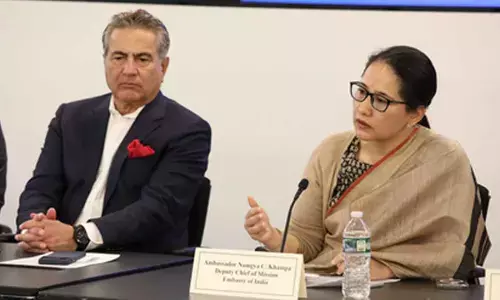Early exposure to technical skills will build future engineers, scientists

Early exposure to technical skills will build future engineers, scientists
Experts believe that it is not a matter of choice to exclude smart technologies out of our lives. Rather, the process needs to begin to introduce every generation, whether it is Gen-X, Millennials or Gen—Z, to the futuristic technologies which will transform sectors such as telecommunication, logistics, warehousing, manufacturing, agriculture, or even medical care
Accessibility to higher education and necessary skills should not be confined based on geographic location, and more importantly, gender. Inclusion of women in skill training at an early stage would pave the way for them to pursue science at the institution level and research.
In a post-Covid-19 era, women's participation in the formal sector is dropping at an alarming rate. As of June 2022, as economists have said that female employment in India has plummeted by 9 percent. Between 2010 and 2020, the number of working women in India dropped from 26 percent to 19 percent, according to data compiled by the World Bank. As the industries adopt complex technologies and embrace virtual reality, women need to be provided hand-holding support to access necessary skills and training to opt for suitable work opportunities. On one hand, as the government focuses on job creations and the increasing number of small businesses in India, women need to be provided with technical skills that may offer better chances of employment in both rural and urban areas. Speaking to The Hans India, Mamata Rani Sharma, Advisor-I, All India Council for Technical Education (AICTE) explained that India is transforming its skill training approach and with that offering information of emerging technologies in different regional languages. The institution has taken upon itself to remove obstacles such as access to internships, study materials and updates on the smart technologies paving the way in the Indian market.
Experts believe that it is not a matter of choice to exclude smart technologies out of our lives. Rather, the process needs to begin to introduce every generation, whether it is Gen-X, Millennials or Gen—Z, to the futuristic technologies which will transform sectors such as telecommunication, logistics, warehousing, manufacturing, agriculture, or even medical care.
According to the Congressional Joint Economic Committee, in India only 14 percent of all professionals working in engineering are women, inspite of the efforts being made to increase the number of females working in STEM fields. The AICTE Chief Coordinating Officer Mr. Buddha Chandrasekhar has said that early introduction of technical education to children may transform the future aspiration to follow the field of engineering and/or scientific research.















